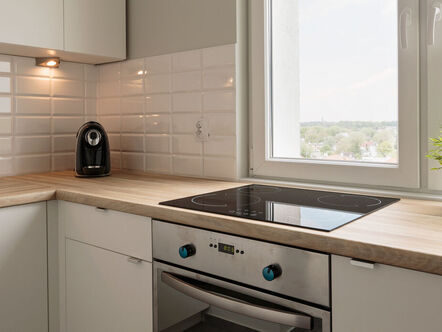Letting your property also comes with a range of legal responsibilities. At Thomas Morris we take safety regulations and legislation very seriously in order to protect both our tenants and our landlords. Here we outline the key safety regulations and landlord responsibilities when letting out a property.
Anti-money laundering
These are standard checks to confirm the identity and authenticity of any funds involved in a transaction. HMRC targets any criminal activity in the property sector and require all estate agents to obtain and hold identification and proof of address for all customers. These checks apply to landlords and prospective tenants. Agents are also required to establish whether anyone else will benefit from the transaction, so where appropriate, the source or destination of funds may also be requested.
Cleaning and check-in
Rental properties are required to be clean when a tenant moves in. A check-in records the state of the property when the tenant moves in. Such a record minimises disagreements and delays at the end of a tenancy and helps smooth discussions around claiming for cleaning or damage. We can help arrange professional cleaning before the move-in date and an independent inventory at check-in to record the condition of the inside and outside the property.
Inventory
Since the introduction of deposit protection legislation it has been essential that landlords have detailed and clear evidence of a properties condition at the start and end of a tenancy. The security deposit belongs to the Tenant at all times and it is the Landlord’s responsibility to prove tenant liability for any deductions they wish to propose.
At Thomas Morris we use independent, fully trained Inventory Companies to provide detailed reports which will assist our highly experienced Property Managers. We organise the inventory and check out reports, negotiate deposit deductions where necessary and deal with any disputes in what is often the most challenging part of tenancy.
Electrical Installation Condition Report (EICR)
The Electrical Safety Standards in the Private Rented Sector (England) Regulations 2020 came into force on 1 June 2020 and now applies to all new tenancies.
These new regulations require landlords to have the electrical installations in their properties inspected at least every 5 years and tested by a qualified and competent engineer. Landlords will also have to provide a copy of the electrical safety report to their tenants as well as to the local authority if works are required or if requested.
Thomas Morris will arrange for an approved engineer to carry out the inspection report and issue the required certificate and to advise on any remedial works to ensure compliance with the new regulations. We recommend that landlords commission the report as soon as possible so that any necessary remedial works can be completed and void periods kept to a minimum.
Energy Performance Certificate (EPC)
Since 1st October 2008, under the Energy Performance of Buildings 2007 (amended 2011) all rental properties in England and Wales are required to have an Energy Performance Certificate (EPC) prior to letting. This is a European directive to help reduce the Carbon Footprint of your rental property.
These reports and graphs enable tenants to see at a glance how your property is assessed against other properties, and advises how some simple remedies (such as the use of low energy lighting, loft insulation, cavity wall insulation) can have a huge impact on the environment and also on the tenant’s energy bills! EPCs are valid for 10 years.
From 2018 Landlords must ensure their privately rented properties meet a minimum energy efficiency standard (confirmed at EPC rating ‘E’ or above). For more information on energy grants or ways to improve your home’s energy efficiency please visit www.gov.uk/energy-grants-calculator
Fire and furnishings regulations
Landlords need to make sure that any applicable furniture complies with the Furniture and Furnishings (Fire Safety) Regulations 1988 (as amended 1993, 2010), and safety labels are still attached. This applies to all furniture left by the Landlord even if the furniture is stored away in a shed for example. Thomas Morris can advise and assist you with this before the tenancy commences.
Please ensure that domestic upholstered furniture, furnishings and other products containing upholstery comply and have a safety label still attached (unless stated otherwise). For those items without a label original documentation would need to be supplied confirming compliance.
Smoke & CO alarm testing
It is now law for there to be smoke alarms present on each floor and a CO alarm for any room with a fuel burning appliance (excluding gas cookers).
A push button test will be carried out by Thomas Morris as standard practice on the day your tenancy commences however this can only determine there is power and an audible alarm. For added reassurance the additional test with this Safety Assessment goes a step further deploying real smoke and gas testing on your alarms.
Gas Safety Certificates
To ensure your tenants safety, all gas appliances and flues need to undergo an annual gas safety check – always by a Gas Safe registered engineer. Once this is done a Landlord Gas Safety Record Certificate will be issued.
Thomas Morris will arrange for an approved Gas Safe contractor to attend and issue certification as above in line with the Gas Safety (Installation and Use) Regulations 1998.
House in Multiple Occupation (HMO) regulation & licensing
A rented property is considered a House in Multiple Occupation if a property is occupied by three or more people, forming two or more households, who also share facilities such as the kitchen or bathroom, regardless of the number of storeys the property has. As well as all the normal legal responsibilities, HMO landlords must ensure that their property complies with a range of additional rules. You can read about these in more detail in our HMO guide.
HMO licences were introduced as part of the Housing Act 2004 to protect people living in shared houses, which were often overcrowded with poor fire safety measures in place. If you want to rent out your property as an HMO in England or Wales you must contact your council to check if you need a licence. These are mandatory for ‘large’ HMOs (5 or more people sharing), but it’s worth checking with your local council even if your property is smaller and rented to fewer people, as you may still need a licence, depending on the rules in your area. A licence is valid for a maximum of 5 years.
Housing, Health and Safety Rating System (HHSRS)
A trained property inspector will recognise and report on potential safety hazards they observe that may pose a risk to anybody staying or visiting including tenants, contractors and members of the public.
The Homes (Fitness for Human Habitation) Act became law on 20th March 2019. The Act uses the 29 hazards listed in the Housing, Health & Safety Rating System to help define the categories.
Once the report has been completed certification will be issued with any concerns outlined -notifying you of the legislation.
How to Rent Guide
The How to Rent Guide is the checklist for renting in England which must be provided to a new tenant by the landlord or letting agent at the start of their tenancy. The guide gives practical advice about what to do before and during a let. It is available via gov.uk or for further information you can speak to your local Thomas Morris branch.
Income tax
All landlords could be liable to pay tax on their rental income, whether they live in the UK or are based overseas. Further information can be found on the Inland Revenue’s website.
There are specific tax rules for overseas landlords - find out more in our useful guide.
Legionella risk assessment
Legionnaires’ disease is a pneumonia like infection caused by Legionella bacteria, commonly through the inhalation of small droplets of contaminated water. Landlords must assess and control the risk of exposure of tenants to Legionella.
Portable Appliance Testing (PAT)
PAT inspections ensure all portable electrical appliances in your property are tested and approved as safe to use. A PAT certificate documents the safety testing of portable electrical appliances – basically anything that has an electrical plug and can be moved, such as a fridge, freezer, washing machine, toaster etc. Anything rated as unsafe should be replaced or removed from the property. For landlords, it is good practice to have smaller appliances tested every two years and larger items like fridges and washing machines every four years.
Whilst PAT testing is not an official legal requirement for landlords in England and Wales (except for in HMOs), it is considered best practice - the government states that landlords must make sure “the electrical system is safe” and “all appliances they supply are safe”. By ensuring all electrical appliances are fit for use, you are upholding your duty of care to your tenant. Thomas Morris can arrange for PAT certification of appliances in your property.
Repairs
Any problems with the exterior and structure of a property – including roof, chimneys, walls, guttering and drains - are the responsibility of the landlord. So whether it’s a cracked window, a faulty boiler, leak in the kitchen or a leaky seal in the window, it’s down to the landlord to sort it. Landlords are also responsible for keeping the supply of water, gas and electricity in safe working order. Thomas Morris's Fully Managed package takes care of all maintenance issues, so you don’t have to worry about them.
Right to Rent
The Right to Rent scheme helps to make sure that people renting property in the UK have a legal right to be here. Since 2016, Landlords have a responsibility to check all prospective tenants are over 18 years of age. If you let your property to a tenant who does not have the right to rent the penalties can be severe, including unlimited fines and up to 5 years in prison. Right to Rent checks make up part of Thomas Morris’s referencing process.
Deposit protection
Current legislation states that all tenant deposits for Assured Shorthold Tenancies must be protected in accordance with Government regulations.
The Landlord is responsible for ensuring:
- That the Tenant’s Security Deposit is forwarded to or insured by a government approved scheme which will be held for the term of the Tenancy
- That the Tenant with the person paying the deposit (eg: parent or guarantor) receives the relevant Prescribed Scheme Information
- This all must happen within 30 days of receipt of the deposit.
- Thomas Morris will hold the tenants deposit and protect it on your behalf, for which there is an annual charge, please refer to agent.
At the present time this legislation does NOT apply to non-Housing Act tenancies. However, as all client money including security deposits needs to be held in a ring-fenced account, we are more than happy to securely hold the deposit for non-housing Act tenancies in our deposit account.



